Electronic Literature, or Whatever It’s Called Now: the Archive and the Field
Clara Chetcuti
A look at experimentation with crypto-machinic codes in Star Foster’s and David Ravipinto’s Slouching Towards Bethlehem.
image by flickr artist Art Hakker
Screen Capture in Digital Art and Literature: Interrogating Photographic, Interface, and Situatedness Effects
Christelle Proulx
Christelle Proulx argues that screen captures in art and literature projects introduce three different effects on the representation of online world and its relation to offline world. The spatiotemporal specificities of the images produced are first considered through the photographic as a category of thought, then the importance of location is interrogated via the situated knowledges of Donna Haraway (1988) and concludes on the interface effects of this kind of imaging practice.
Poetic Deformance and The Procedural Sonnet
Corey Sparks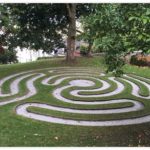
Taking his cue from the first line of Lady Mary Wroth’s 17th Century sonnet sequence, “In this strange labyrinth how shall I turn?” Corey Sparks locates readers in a contemporary, procedural sonnet at the intersection of electronic literature, digital edition creation, gaming, and literary poetics. Sparks includes a photo of a reconstructed medieval labyrinth, taken at St. Fin Barre's Cathedral in Cork, Ireland during his attendance at the 2019 Electronic Literature Organization conference.
Meaning, Feeling, Doing: Affective Image Operations and Feminist Literatures of Care on Instagram
Fanny Gravel-Patry
Gathering screen images and texts shared by artist Les folies passagères on Instagram, Gravel-Patry addresses issues of care that affect women on a daily basis, from mental health to body dysmorphia - but also creating expansive life worlds through our relationality with the digital image, how we operationalize it so that we might think and feel our lives differently.
"These Waves …:" Writing New Bodies for Applied E-literature Studies
K. Alysse Bailey, Lauren Munro, Hannah Fowlie, Megan Perram, Christine Wilks, Sarah Riley, Carla Rice, Astrid Ensslin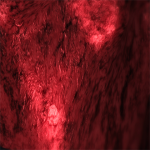
Against the backdrop of écriture feminine and e-lit texts, Ensslin et. al advance methods and findings of the "Writing New Bodies" project (“WNB”; SSHRC IG 435-2018-1036; Ensslin, Rice, Riley, Bailey, Fowlie, Munro, Perram, and Wilks) to lay the foundations of Applied E-literature Research. Their aim is to develop a digital fiction for a new form of contemporary, digital-born bibliotherapy. In following the principles of critical community co-design and feminist participatory action research, WNB engages young woman-identified and gender nonconforming individuals ages eighteen to twenty-five in envisioning worlds where they feel at home in their bodies. The workshops encourage them to engage, conversationally and through reading, co-designing and writing digital fiction, with key challenges facing young women today, including cis- and heteronormative gender relations, racism, anti-fat attitudes, ableism, and familial influences on the ways young women “ought to look” (Rice). This essay originally appeared as a keynote at the 2019 ELO conference in Cork, delivered by Ensslin.
At the Brink: Electronic Literature, Technology, and the Peripheral Imagination at the Atlantic Edge
Anne Karhio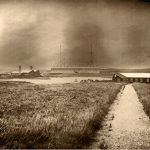
In this keynote, presented at the 2019 Electronic Literature Organization conference in Cork, Ireland, Anne Karhio highlights the importance of electronic literature as no less peripheral in its own construction of social, cultural, networked communities and material geographies. By looking also at recent scholarship on digital infrastructures, media archaeology, and new materialist approaches to communications technology, Karhio delineates changes that emerge from the margins, "from experimentation and risk-taking that questions established conventions, and canons, and flickers at the border of the actual and the imaginary."
Electronic Literature Experimentalism Beyond the Great Divide. A Latin American Perspective
Claudia Kozak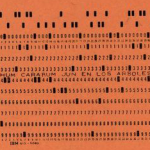
Given the longstanding but limited readership for North American, Euro and Scandinavian e-lit, will Latin America succeed in carrying its experimental and avant-garde approaches to a general e-lit audience? Claudia Kozak's expanded keynote for the 2018 ELO conference in Montreal, titled "Mind the Gap!", explores some first forays in this direction: practices that might hearken back to Puig and Borges in print; Omar Goncedo, Eduardo Darino, Erthos Albino de Souza and Jesús Arellano in the era of mainframes; and (not least) fan fiction over pretty much the entire span of literary writing.
Image: Omar Gancedo, IBM (1966).
At a Heightened Level of Intensity: A Discussion of the Philosophy and Politics of Language in John Cayley’s Digital Poetics
Scott Rettberg, John Cayley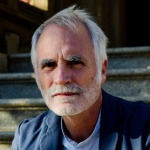
A conversation at a heightened level of intensity, ranging from the aleatory tradition of Emmett Williams, Jackson Mac Low, and John Cage, through post-Poundian poetry and its Chinese influences, kinetic poetry or programmable media where the poem itself is performing, not just the poet. Attention is also given to the Internet as these two literary artists knew it for a very brief moment, before Google and Facebook, circa 2004, "figured out that everybody needed an account."
Notes on a Civics For The Sixth Extinction
Stephanie LeMenager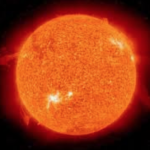
Citing Catherine Gallagher on `fictionality’ as the `ontological ground of the novel,’ LeMenager seeks a similar `alternative grounding’ for progressive, transgenerational social change in a time of epistemic and ecological crisis. The essay is one of many selected for co-production in ebr and our two collections from Bloomsbury Academic, Post-Digital: Critical Debates from electronic book review .
Climate Bot Panegyric: An Interview with Nigel Leck
Lisa Swanstrom
Can we again devise bots, in the tradition of Nigel Leck's AI_AGW, capable of staving off environmental disaster and saving humanity from its own stupidity? Twitter has censored this particular bot that Leck created ¨with the singular mission of hunting down false claims made by climate change deniers, calling them out, and correcting them with information linked from peer-reviewed essays in scientific research journals.¨ With this interview, ebr and our Natural Media co-editors celebrate and memorialize this noble, though brief realization of the critical and creative potential of community built digital media.
Between Plants and Polygons: SpeedTrees and an Even Speedier History of Digital Morphogenesis
Alenda Y. Chang
Toward a more expansive standard of botanical, graphical, ecosystemic and (not least) digital realism.
“The Effulgence of the North”: An Introduction to the Natural Media Gathering
Lisa Swanstrom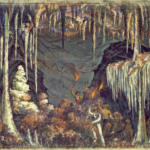
This collection emerges from a panel hosted by the Modern Language Association's MS Forum on Visual Media (http://naturalmedia.org/titles/) in 2017. "Natural media" re-valuates the communicative potential of natural spaces, especially in instances where symbolic import collides with raw matter in a manner that hides from, disguises, or elides stark reality. It considers intersections, collisions, tensions, opportunities, and affordances that arise in the discussion of "Natural Media," both broadly conceived and in its contributors' particular areas of research. It is also in close conversation with research inspired by a previous gathering on a closely related topic: Digital and Natural Ecologies.
Toward a Particulate Politics: Visibility and Scale in a Time of Slow Violence
Zachary Horton
Smaller than anything the human eye can see, yet not so small as the elementary waves and dark matter known to modern science: the particle is an appropriate figure for our present, intermedial ¨shuttling between entities at different scales.¨
Amphibia: Infrastructure of the Incomplete
Karen Elizabeth Bishop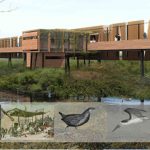
A slightly different version of this work originally appeared as part of a longer article, "The Architectural History of Disappearance: Rebuilding Memory Sites in the Southern Cone," in the December 2014 issue of the Journal of the Society of Architectural Historians. I am grateful to the University of California Press for permission to reproduce portions of that work here.
Lynn Margulis and the (Re)Making of the Planet
Diana Leong
With Gaia theorist Lynn Margulis and posthumanist Bruce Clarke, Diana Leong argues against the fetishizing of genes and seeks an alternative to the modern synthesis of Darwinian natural selection and Mendelian inheritance. These amodern, posthumanist approaches instead offer a gradual accumulation and transmission of mutations, and a coevolutionary embeddedness within diverse environments and the socio-political structures responsible for them.